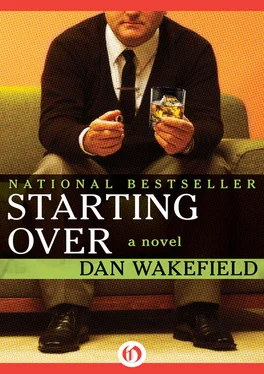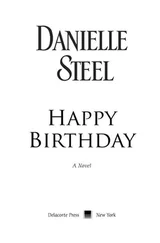“Damn, that’s too bad.”
“It’s just a matter of getting it all together. It’s bound to happen soon now.”
“Hell, yes.”
“That’s why I have to live like this—temporary. Ready to go.”
“Go? Where?”
“The Coast.”
“Oh.”
“I’ve got a suitcase packed. In the closet.”
“Well, that’s—uh—very shrewd of you. Looking ahead that way.”
When Potter left, Ed Shell gave him one of his scripts to read. Potter was both fearful and fascinated, wondering what it would be like, terrified it would be a hopeless exercise, but dying to know if it just might—by the most incredible chance—be a goddamn miraculous feat of genius.
It was neither.
Potter lay on his bed at home, smoking a cigarette, holding the script on his lap, pondering the thing. The script was called “Karen.” It was about a bright young girl who went into social work and was disillusioned by the bureaucracy but still kept her faith in helping people and fell in love with a poor young guy on her welfare route who worked for his old man at a fish market in the Boston harbor. It wasn’t anything that would knock you out, and had its share of cliché ideas and situations, but it wasn’t all bad either; it wasn’t as bad as a lot of stuff Potter had seen on the screen or on television. As far as he could tell, it could perfectly well be done, would help fill up time and space for a number of people, would bring money and satisfaction to Ed Shell, who would have with its production confirmed his image of himself. And it could just as well go begging, lost, undone, for all the justifications of it that could also be made, and Ed Shell could end up—how many years later—waiting for the call to the Coast, keeping his suitcase packed. But you don’t keep your suitcase packed forever. Potter knew all about that. If it didn’t happen, the day would finally come when Ed Shell would unpack that suitcase. Potter would just as soon not be around to see it or know about it.
It occurred to Potter, though, that even if Shell had to someday unpack his dream, in the meantime it gave a shape and purpose to his life, helped him get through the day. The value of a dream was that, like booze or religion or dope, it filled you up for a while.
Potter’s next evening was empty. Marilyn had a date with a guy from her Existentialism course who had asked her for coffee after the last class, and had sprung for an invitation to dinner. She had high hopes for this one, a lawyer who was taking the course to “broaden his horizons.” Potter thought that sounded a little hokey, but he didn’t want to disillusion Marilyn in advance. Besides, he wished her well and hoped something nice might come of the date. A lawyer who wanted to broaden his horizons might just turn out to be her Mister Right.
When Potter complained about his own lack of companionship for the evening, Marilyn suggested he try going to a bar called The Pub, where she said it was possible for nice men to meet nice women; it wasn’t a hooker place or anything. She had been there herself a couple of times with girls from the office, and sometimes they’d made a connection with a couple of guys, perfectly decent sorts, just wanting to meet people.
With no other prospect for the night but television, Potter went.
There were a lot of little tables, but he headed straight to the bar. After his eyes adjusted to the dim light of the place, he swung around on his barstool, casually, and gave the place a quick survey. Most of the girls were in couples; some had one or two men already joining them or trying to join them. But one girl, at a table way back against the wall, sat alone. Potter peered at her through the gloom, and she stared right back. He looked away, looked back, and she still was staring straight at him. No mistaking it. He finished off his drink, and went over to her table.
“May I sit down?” he asked.
“Sure.”
“Would you like a drink?”
“Thanks. I have one.”
The girl’s coat was folded on a chair, and a pile of books, along with a notebook, sat on top of it. She didn’t look like a student, though; a little too old, a little too carefully dressed. She wore tiny pearl earrings, a fashionable pants suit, and hornrimmed glasses.
“Are you a student?” Potter asked. He figured if she wasn’t, the mistaken assumption would be flattering.
“I take some courses. Twice a week, I come in to town.”
“You live out of town?”
“In Framingham.”
“Oh—that’s sort of a suburb, isn’t it?”
“I guess.”
“Isn’t that kind of—inconvenient? Unless you’re married?”
“My husband’s dead,” she said quickly.
“Oh. I’m sorry.”
“I’m taking a course in poetry writing.”
“Oh? That must be—uh, interesting.”
“I just started. But I like it. I like to be able to express myself.”
After two drinks she agreed to have a drink at Potter’s apartment. She wouldn’t go in his car, though, but insisted on following him, in her own. It was a station wagon. Potter feared she might just lose herself in traffic, on purpose, but she stuck on his tail, and pulled up behind him across from his apartment.
He put on classical guitar, and got them drinks. She took off the coat to her pants suit, and Potter saw that she had enormous breasts. He found it hard to believe his good fortune. Going to a bar and picking up a woman who seemed to be reasonably intelligent and pleasant, and also was blessed with unusual physical endowments. He was beginning to feel a warm glow of good feeling, when the woman said suddenly, “There’s something I have to tell you.”
Potter braced himself.
“I’m a terrible liar,” she confessed.
“Oh?”
“Yes. For instance, I’ve lied to you already.”
“You have?”
Potter mulled over the possibilities. She had said she was twenty-eight; maybe she was really thirty-one. Maybe it was something as silly as that.
“You remember I told you my husband was dead?”
“Yes,” Potter said, “you did mention that.”
My God , he thought, did I bring home a murderer? The Suburban Strangler?
“Well, that was a lie,” she said. She paused, fixing her gaze intently on Potter, and said, “My husband’s not dead—I just wish he was dead.”
“Oh,” Potter said. “Well, that’s quite a difference.”
“Yes,”
Potter lit a cigarette. “Well, I’m awfully sorry,” he said. “I mean, I’m not sorry that your husband’s not dead—I don’t even know him. I’m sorry you wish he was dead. Since he’s not.”
Potter was aware his response was complicated, but he doubted there was any graceful way for commenting on this particular situation. “Maybe you could get a divorce?” he suggested.
“He’d never do that. He’d kill me first. He swore he would.”
“Oh.”
“He’s very violent.”
“I see.”
Potter became more sober as the information began to sink in. It occurred to him that if this lady’s husband would kill her for trying to get a divorce he might easily kill her for sleeping with another man. Or in fact, while he was at it, might just as well kill the other man.
“Under the circumstances,” Potter said, “maybe the wisest course—I mean, for now—uh, would be for you to just, uh, go back to your husband.”
She shrugged. “Mind if I finish my drink?”
“No, not at all. Take your time.”
The woman who wished her husband was dead left around ten, and Potter poured himself a drink—he had waited to make a new one until she was gone, fearing if he got too sloshed the allure of the lady’s beautiful body might overcome the rational fear of her killer husband.
Читать дальше












